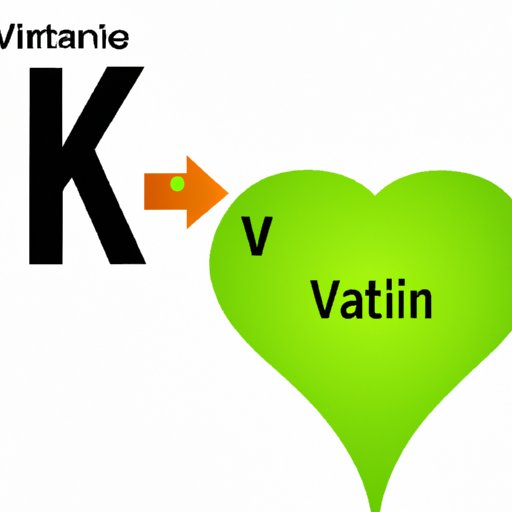I. Introduction
Vitamin K is an essential nutrient that plays an important role in our overall health. This fat-soluble vitamin is necessary for blood clotting, which is crucial for stopping bleeding after an injury or surgery. But its importance doesn’t stop there. Vitamin K is also essential for strong bones and heart health. In this article, we will explore what Vitamin K does, why it’s important, and how to get enough of it in our diet.
II. The Role of Vitamin K in Blood Clotting and Bone Health
Blood clotting is a complex process that involves several steps and factors. Vitamin K plays a vital role in one of those steps, where it helps convert a protein called prothrombin into thrombin. This conversion is essential for clot formation and stopping bleeding. Without enough Vitamin K, our blood can’t clot properly, which can lead to bleeding disorders and other health problems.
Vitamin K is also important for bone health. It helps our body produce osteocalcin, a protein that binds calcium to our bones and makes them stronger. Several studies have shown that people with low Vitamin K intake are at a higher risk of bone fractures and osteoporosis.
III. Why Vitamin K is Essential for a Healthy Lifestyle
Aside from its role in blood clotting and bone health, Vitamin K has several other health benefits:
- It helps regulate blood calcium levels, which is essential for proper muscle and nerve function.
- It has anti-inflammatory properties, which can help reduce the risk of chronic diseases such as heart disease, arthritis, and cancer.
- It may improve insulin sensitivity and lower the risk of type 2 diabetes.
The recommended daily intake of Vitamin K varies depending on age and gender. For adult men, it’s 120 micrograms per day, while adult women need 90 micrograms per day. Pregnant and breastfeeding women need slightly more.

IV. Vitamin K and its Connection to Heart Health and Cancer Prevention
Research has shown that Vitamin K may have a beneficial effect on heart health. Studies have found that people with low Vitamin K levels are at a higher risk of developing heart disease and dying from it. Vitamin K may help reduce arterial calcification, which is a buildup of calcium in the arteries that can lead to heart attacks and strokes.
Vitamin K also has a potential role in cancer prevention. Certain types of cancer, such as prostate and liver cancer, have been linked to low Vitamin K intake. Studies have shown that Vitamin K may inhibit cancer cell growth and promote cancer cell death.
V. The Different Types of Vitamin K and their Functions in the Body
There are two types of Vitamin K: phylloquinone (Vitamin K1) and menaquinone (Vitamin K2).
Vitamin K1 is found in green leafy vegetables such as kale, spinach, and broccoli. It’s the primary dietary source of Vitamin K for most people. Vitamin K2, on the other hand, is produced by bacteria in the gut and is also found in some fermented foods such as cheese and natto.
Vitamin K1 is essential for blood clotting and bone health, while Vitamin K2 has additional benefits for heart health. It helps activate a protein called matrix Gla protein, which prevents calcium from building up in the arteries and other soft tissues.
VI. How Vitamin K Deficiency can Impact Your Health and Well-being
Common signs of Vitamin K deficiency include excessive bleeding and bruising, nosebleeds, and bleeding gums. Severe Vitamin K deficiency can lead to bleeding disorders such as hemophilia, which can be life-threatening.
People who have conditions that affect nutrient absorption, such as celiac disease or inflammatory bowel disease, may be at a higher risk of Vitamin K deficiency. Long-term use of certain medications such as antibiotics and blood thinners can also interfere with Vitamin K absorption and metabolism.
VII. Foods that are Rich in Vitamin K and their Benefits
Fortunately, Vitamin K is found in many delicious and nutritious foods. Some of the best sources of Vitamin K include:
- Kale
- Spinach
- Broccoli
- Brussels sprouts
- Swiss chard
- Cabbage
- Green peas
- Asparagus
- Green beans
- Prunes
- Blueberries
- Cheese
- Natto
In addition to their Vitamin K content, these foods are also rich in other nutrients such as fiber, vitamins, and minerals. Eating a varied and balanced diet that includes plenty of colorful fruits and vegetables can help ensure you get enough Vitamin K and other essential nutrients.
VIII. The Importance of Vitamin K for Newborns and Pregnant Women
Infants are born with very low levels of Vitamin K, and their gut bacteria are not yet fully developed to produce Vitamin K2. This puts them at a higher risk of bleeding disorders, including brain hemorrhages. That’s why all babies receive a Vitamin K injection shortly after birth to prevent these complications.
Pregnant women also need to pay attention to their Vitamin K intake. Low Vitamin K levels have been linked to a higher risk of bleeding during childbirth. Eating a healthy diet that includes plenty of Vitamin K-rich foods can help ensure a healthy pregnancy and delivery.
IX. Conclusion
Vitamin K may not be as well-known as other vitamins such as Vitamin C or D, but it’s just as essential for our health and well-being. From blood clotting to bone health, heart health, and cancer prevention, this nutrient plays a crucial role in many aspects of our health. By eating a varied and balanced diet that includes plenty of Vitamin K-rich foods, we can ensure we get enough of this vital nutrient.
So next time you’re enjoying a plate of delicious kale or enjoying a slice of cheese, remember the many benefits of Vitamin K and how it’s helping keep you healthy and strong.
